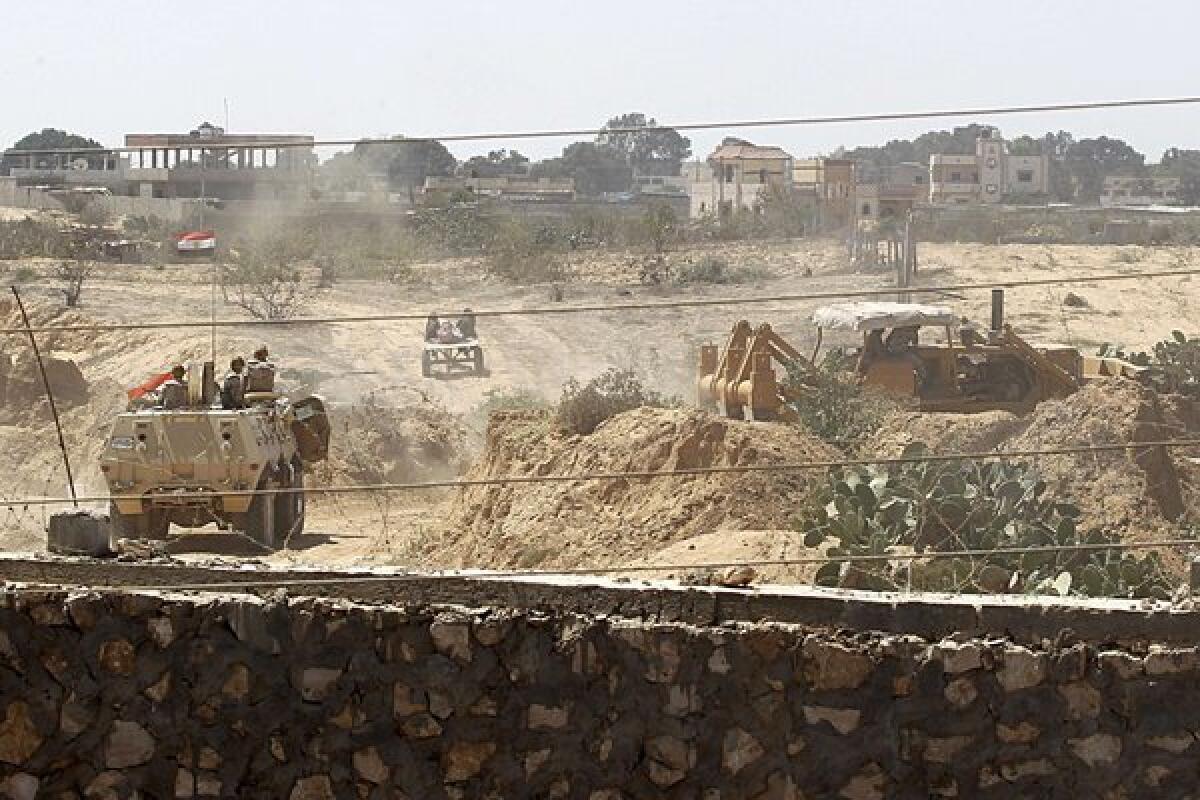Egypt wages major offensive against Islamists in Sinai Peninsula

- Share via
CAIRO -- Egypt’s military raids across the Sinai Peninsula appear to be the strongest offensive in years against Islamist militant networks that authorities fear are plotting a wave of attacks against government institutions and tourist resorts.
Tanks and helicopter gunships for a third day Monday targeted Islamist fighters in desert villages that border Israel and the Gaza Strip. The army also has destroyed smuggling tunnels leading into Gaza, which is controlled by the Palestinian militant group Hamas, an ally of Egypt’s deposed Islamist President Mohamed Morsi.
The military’s strategy is two-fold: routing extremists, including foreign fighters inspired by Al Qaeda, and crimping scores of tunnels that provide Hamas with fuel, weapons, cars, medicine, groceries and other goods. Cairo has accused Hamas of instigating unrest and conspiring with Morsi’s Muslim Brotherhood movement.
The army, which has confiscated explosive belts, detonators and bombs, said it is carrying out the “biggest military operation in North Sinai to attack terrorist lairs and arrest armed jihadists and outlaws.”
The offensive intensified after a militant group in the Sinai reportedly claimed responsibility for Thursday’s car bomb assassination attempt against Egyptian Interior Minister Mohamed Ibrahim. The minister said militants in the Sinai, mostly radicalized Bedouin tribesmen, are seeking retribution for a crackdown that has killed hundreds of Brotherhood supporters over the last month.
At least 20 suspected militants and two soldiers have been killed since Saturday. The lawless Sinai, which has received smuggled weapons, including missiles, from Libya and fighters from Saudi Arabia and other countries, has become increasingly dangerous. Dozens of police and soldiers have been killed in ambushes since the July 3 coup that toppled Morsi.
It was impossible to verify the army’s account of its latest offensive. Security forces have often exaggerated their successes in the Sinai. Independent assessments are scarce. Last week, police arrested journalist Ahmed Abu Deraa, whose reports on security in the region have frequently disputed the government’s versions.
Israel, which has complained over the years that Egypt was failing to contain Sinai’s instability, commended Cairo’s military actions over the weekend.
“It is very important that the Egyptians are carrying out a broad campaign against terror, and what they are doing is impressive,” Amos Gilad, an Israeli Defense Ministry official was quoted as saying at a security conference. “The important thing is that a battle is being waged against terror.”
The Sinai’s deserts and isolated villages have been a security risk for generations. Unemployment and government neglect have turned the peninsula, which also borders the shipping lanes of the Suez Canal, into a stronghold for smugglers, criminal clans and extremists. Tribal justice prevails, and some elders said the military offensive is creating fresh ill will and suspicion toward Cairo.
“Security forces are in many ways doing more harm than good,” said a Bedouin tribal leader who asked not to be named for security reasons. “The crackdown is very random, and these kinds of practices create grounds for revenge.
“We are a tribal culture, and we believe in vengeance, and so many of the attacks on security forces might not have been militants at all, but a direct result of [the government’s] random oppression.”
The crackdown on the Brotherhood -- most of its leadership is in jail -- has polarized Egypt and angered more radical Islamist organizations. Authorities have arrested extremists, including Mohammed Zawahiri, the brother of Al Qaeda leader Ayman Zawahiri. Officials have warned Egyptians to brace for terrorist attacks reminiscent of the battle against Islamists between the 1980s and early 2000s, when government institutions and tourist sites were targeted.
The government has not relented, portraying the Brotherhood as a terrorist organization despite the group’s condemnation of violence. Authorities have stepped up legal maneuvers against the Brotherhood, including a new investigation into alleged financial crimes against Morsi, who was earlier charged with murder and espionage for his ties to Hamas.
A new 50-member committee dominated by secularists and technocrats has begun writing a new constitution to replace the one written last year by Islamists. The earlier document was approved by Morsi and opened the way for Islamic law to more firmly influence public life. It became a rallying cry for liberals who accused the Brotherhood of endangering civil and religious freedoms.
The Islamist-drafted charter was “the most backward constitution in Egypt’s history,” said Mohamed Salmawy, spokesman for the new committee. “Amending the constitution is not possible as constitutions are not merely a set of articles but rather a soul and a philosophy.”
ALSO:
Tens of thousands protest Mexican oil reforms
Kerry presses case for Syria strike, reaffirms bond with Britain
Kremlin-backed candidate declares victory in Moscow mayor’s race
Twitter: @JeffreyLAT
Special correspondents Ingy Hassieb in Cairo and Batsheva Sobelman in Jerusalem contributed to this report.
More to Read
Sign up for Essential California
The most important California stories and recommendations in your inbox every morning.
You may occasionally receive promotional content from the Los Angeles Times.











